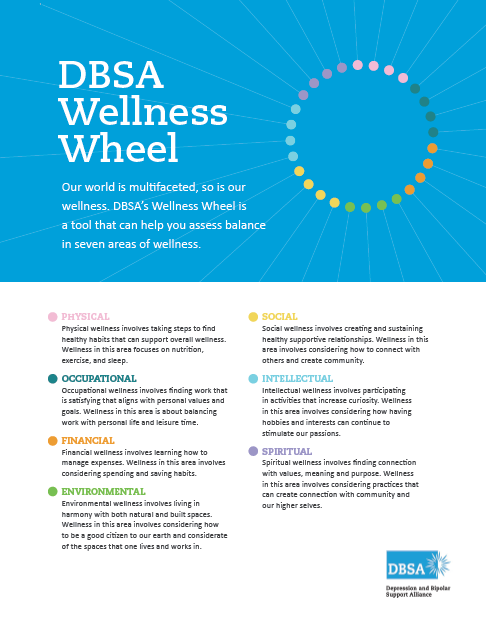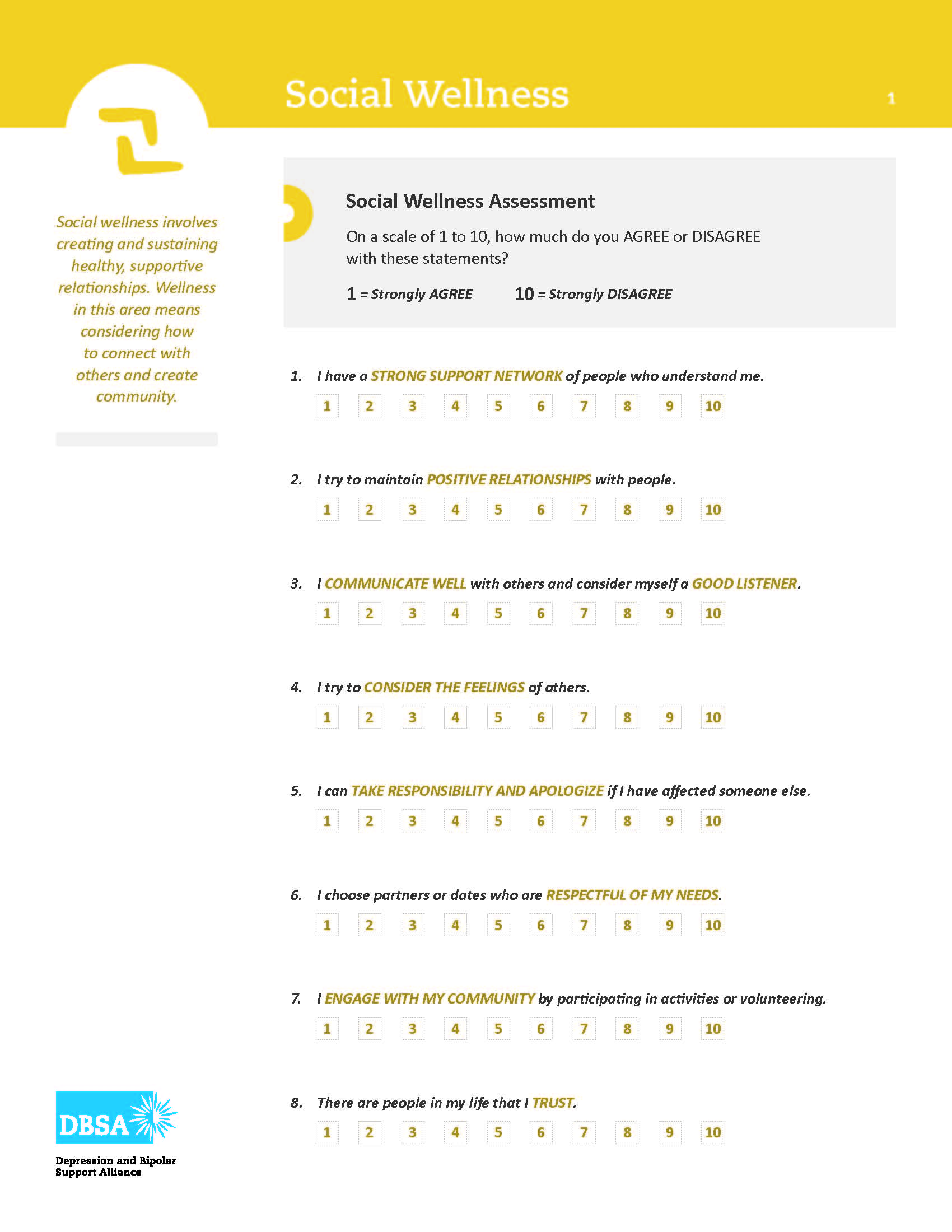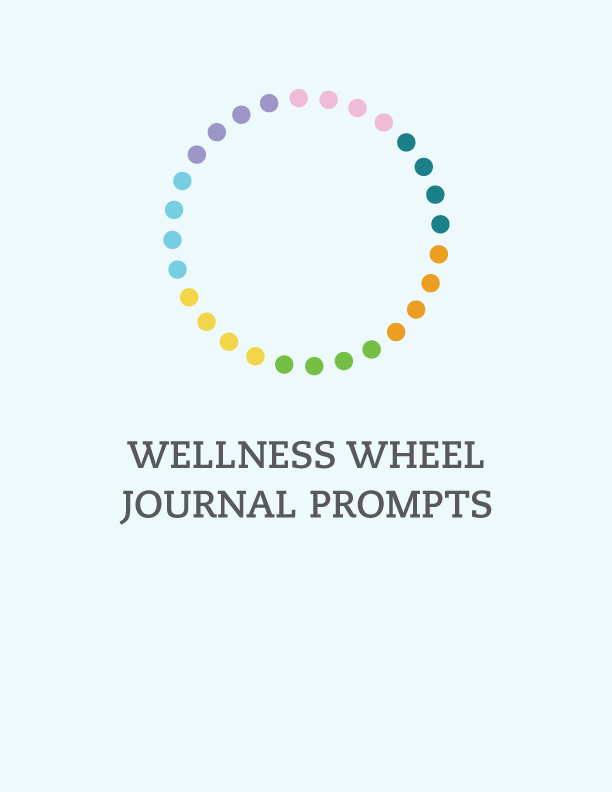Connecting with others is an important part of your overall well-being, yet you may find it’s no easy task. Social wellness describes the quality of relationships you have with other people and how you connect with your community. When you live with depression or bipolar disorder, building and keeping relationships can be challenging. The DBSA Wellness Wheel can help you think through ways to create relationships that are healthy and nurturing.
New resource: Join us as we explore social wellness with DSBA Scientific Advisory Board member, Steven D. Hollon, PhD.
Taking a closer look at your relationships
How do you feel about the way you relate to the people in your life? Do you feel fully connected to the community that surrounds you? Community may mean the people who live near you, your classmates or co-workers, others who share the same background or interests with you, or members of your support group.
Successful connection with others can take time and effort. Some strategies include:
- Recognizing what you need and enjoy from your relationships and community.
- Communicating your needs with people who make you feel safe and comfortable.
- Doing your best to be aware of the needs of those around you.
- Finding ways to meet new people – for example, joining a club or meetup group, playing sports, or reconnecting with positive people you haven’t seen in a while.
- Understanding that you may need different types of interaction when you feel depressed or slowed down, compared to when you feel sped up.
Nurturing positive relationships
If you have experienced trouble in relationships with friends and family, you are not alone. No matter where you are today in your wellness journey, you deserve positive, supportive relationships – and there are many ways you can create them for yourself.
Whether you’re with a family member, friend, or partner, you should always feel physically and emotionally safe. With time, you will find people you can trust. Building trust with others must always be a two-way street. It includes respecting each other, communicating honestly, expressing what you need, being aware of what the other person needs, and establishing boundaries for both people.
Support groups: a community of peers who care about you
Support groups can be an effective way to feel connected to others. These groups act as a safe, confidential, judgment-free zone where you can share your experiences and questions while listening to others and providing support. Many are free of charge, while others welcome voluntary donations to help with group expenses. You can find a DBSA support group here.
When you take part in a support group, you can set your own boundaries and expectations. For example, you may decide you want to simply listen. Or you might feel comfortable sharing your own stories. Over time, you may find your support group becomes a place to learn more about yourself and ask others to hold you accountable for the goals you set for yourself.
With a trained facilitator leading the sessions, support groups can also be a great place to find recommendations for resources you need, such as a good book, a wellness tool, or a local doctor, psychiatrist, or therapist.
The decision to talk about your mental health condition
When you feel comfortable in a relationship, you may decide it’s time to talk about your mood disorder. While the person you’re talking with may have questions, especially if they don’t know much about depression or bipolar, you should never feel responsible for providing all the information they need. There are many good books on mood disorders, as well as support groups for family and friends that can help people learn more.
As you share your story, remember that living with a mood disorder does not define who you are as a person. You are more than just this one aspect of your health – and in your relationships, you want to be seen as a whole individual with strengths, talents and goals. Acknowledging your mood disorder as one part of your life can actually benefit your relationships. For example:
- Talking about your experiences gives you the opportunity to feel seen and understood.
- It shows the respect and trust you have for the other person.
- It gives others a clearer picture of the strategies you use to maintain wellness.
- It also gives them the chance to support your wellness goals.
When relationships hurt
Every relationship has its bumps, and it is normal to have disagreements. However, if you consistently feel bad about yourself when you are with someone, this is a sign you should never ignore.
Feeling judged, ignored, or disrespected in a relationship means it’s time to think seriously about what’s happening. Your health and well-being come first – so if you don’t feel comfortable with someone, take appropriate steps to change things. This might simply mean spending less time with this person or deciding to see him or her only in certain places or situations where you feel comfortable.
Important: If you find yourself in any relationship that threatens your physical or mental health, seek immediate help from a doctor or therapist.
Easing isolation and loneliness
Everyone feels lonely sometimes, but isolation is something different. It occurs when you have little contact and social connection with others. Issues that can lead to chronic isolation include:
- Unemployment
- Family caregiving demands.
- Lack of transportation.
- Chronic illness or disability.
- Fear, anxiety, or lack of confidence in yourself.
- Heavy workload at home or school.
- Money concerns that keep you from eating out, taking classes, etc.
- Moving to a new area where you don’t know many people yet.
Being isolated makes it harder for you to live with a mood disorder. It can also lead to problems with your physical health. To stay well, you must find ways to work through issues that are keeping you away from others.
Because social connection is critical to your health, you will need to look for ways to stay in contact. Even small adjustments can make a real difference. For example, you might try:
- Joining a club or taking a class.
- Exploring a new hobby with friends.
- Joining a meetup group for newcomers.
- Reconnecting with friends you haven’t seen in a while.
- Going to a concert, trivia night, or lecture.
- Finding a faith community where you feel welcome.
- Video conferencing or calling friends and family.
- Seeking out Medicaid or other benefits that can help with health and mobility issues.
The 7 areas of the DBSA Wellness Wheel can be mutually supportive. For example, on the physical wellness page, you will find tips for activity and exercise that can also help you meet other people. On the intellectual wellness page, we discuss having a positive mindset, which helps with relationships, too.












